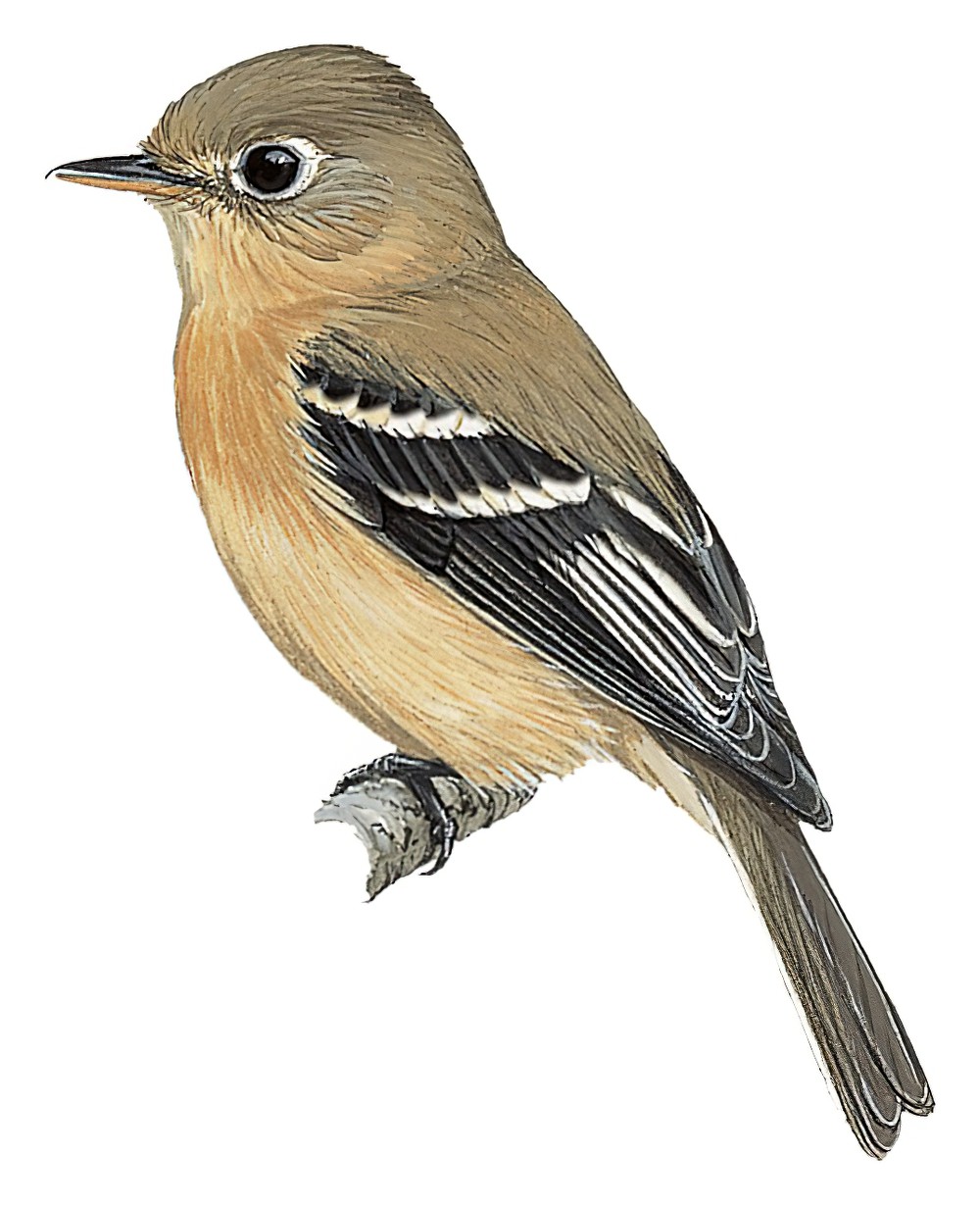Buff-breasted Flycatcher / Empidonax fulvifrons

Buff-breasted Flycatcher
SCI Name:
Protonym: Muscicapa fulvifrons Descr.SixteenNewSp.N.Am.Birds pl.2 fig.2
Taxonomy: Passeriformes / Tyrannidae / Empidonax
Taxonomy Code: bubfly
Type Locality: Texas; ?error, probably mountains of northeastern Mexico as suggested by Ridgway, 1884, Proc. Biol. Soc. Washington, 2, p. 109; restricted to Miquiahuana, Tamaulipas by Lowery and Dalquest, 1951, Univ. Kansas Publ., Mus. Nat. Hist., 3, p. 612.
Author: Giraud
Publish Year: 1841
IUCN Status: Least Concern
DEFINITIONS
EMPIDONAX
(Tyrannidae; Ϯ Acadian Flycatcher E. virescens) Gr. εμπις empis, εμπιδος empidos gnat, mosquito; αναξ anax, ανακτος anaktos lord, master (cf. ναξω naxō will squeeze < νασσω nassō to squeeze (Merriam 1884)); "74. Empidonax pusillus Cab. Tyrannula pusilla Sws. — Myiobius pusillus Gray. Muscicapa pusilla Lembeye. — Moscarita olivada. Dieser Vogel wurde in Habana auf einem platten Dache todt gefunden. ... Die Gattung Empidonax umfasst kleinere und zierlichere Arten, mit schwächerem, weniger entwickeltem Schnabel. Die Flügel sind von mittelmässiger Länge, verhältnissmässig spitzer und länger als bei Myiarchus, jedoch kürzer und weniger zugespitzt als bei Contopus; die Läufe sind verhältnissmässig höher; der Schwanz ist schwach ausgerandet." (Cabanis 1855); "Empidonax Cabanis, 1855, Journ. f. Ornith., 3, p. 480. Type, by monotypy, Empidonax pusillus Cabanis = Platyrhynchus virescens Vieillot." (Traylor in Peters, 1979, VIII, pp. 135-136).
Var. Emipdoanx.
Synon. Cnemonax, Muscaccipiter.
fulvifrons
L. fulvus tawny; frons, frontis forehead, brow.
SUBSPECIES
Buff-breasted Flycatcher (pygmaeus)
SCI Name: Empidonax fulvifrons pygmaeus
pygmaea / pygmaeum / pygmaeus / pygmea / pygmeum / pygmeus
L. pygmaeus pygmy < Gr. πυγμαιος pugmaios pygmy, of the size of a fist < πυγμη pugmē fist.
● ex “Flat-billed Auk” of Latham 1785, and “Pigmy Auk” of Pennant 1785 (Aethia).
● ex “Pygmy Parrakeet” of Latham 1781 (syn. Charmosyna palmarum).
● “73. PLATALEA. ... pygmea. 3. P. corpore supra fusco, subtus albo. Mus. Ad. Fr. 2. p. . . Habitat Surinami. Magnitudo Passeris.” (Linnaeus 1758) (Calidris).
● ex "Pygmy Curlew" of Pennant 1773, and Latham 1785 (syn. Calidris ferruginea).
● ex “Petit Gobe-mouche tacheté de Cayenne” of d’Aubenton 1765-1781, pl. 831, fig. 2, “Gobe-moucheron” of de Buffon 1770-1783, and “Dwarf Fly-catcher” of Latham 1783 (syn. Myrmotherula brachyura).
Buff-breasted Flycatcher (fulvifrons)
SCI Name: Empidonax fulvifrons fulvifrons
fulvifrons
L. fulvus tawny; frons, frontis forehead, brow.
Buff-breasted Flycatcher (rubicundus)
SCI Name: Empidonax fulvifrons rubicundus
rubicundus
L. rubicundus red, ruddy < rubere to be red < ruber red.
Buff-breasted Flycatcher (brodkorbi)
SCI Name: Empidonax fulvifrons brodkorbi
brodkorbi
Prof. William Pierce Brodkorb (1908-1992) US ornithologist, palaeontologist (syn. Aegolius acadicus, syn. Aimophila rufescens (ex Aimophila rufescens cinerea Brodkorb, 1940), ‡Cyanocorax, subsp. Empidonax fulvifrons, ‡Gallinula, syn. Melanerpes erythrocephalus, ‡Milvago, subsp. Polioptila plumbea, syn. Turdus merula intermedius).
Buff-breasted Flycatcher (fusciceps)
SCI Name: Empidonax fulvifrons fusciceps
fusciceps
L. fuscus dusky, brown; -ceps -capped < caput, capitis head.
Buff-breasted Flycatcher (inexpectatus)
SCI Name: Empidonax fulvifrons inexpectatus
inexpecta / inexpectata / inexpectatum / inexpectatus / inexpectus / inexspectata / inexspectatus
L. inexspectatus unexpected, surprising, unlooked for < in- not; exspectatus awaited, expected < exspectare to await.
● “In view of the stability shown by Arremonops conirostris conirostris through a wide area, the appearance of this form so near the type-locality of that race is surprising and inexplicable” (Chapman 1914) (subsp. Arremonops conirostris).
● “It certainly was unexpected to find such a striking and hitherto unknown species on Guadalcanar, and this and the discovery of other new forms on the island shows that the ornithological exploration of Guadalcanar has hitherto been very imperfect” (Hartert 1929) (Guadalcanaria).
● “et necata inexpectatum nobis gaudium dedit novae speciei, ante nunquam visae” (Forster 1844) (Pterodroma).
● "Named both for the unexpected nature of its distribution, being restricted to two provinces of Ghana, and the fact that there are no obvious geographic barriers that separate it from two other members of the genus" (Voelker et al. 2016) (subsp. Stiphrornis erythrothorax).
● “On examining a large series of birdskins collected in the northern parts of Celebes and presented to the Leyden Museum by S. C. I. W. van Musschenbroek, Esq., I was quite astonished to find, that there exists in the Minahassa, beside Strix [= Tyto ] Rosenbergii, another large species of Barn-owl, very different as well from Strix Rosenbergii as from all the other known species” (Schlegel 1879) (Tyto).
UPPERCASE: current genus
Uppercase first letter: generic synonym
● and ● See: generic homonyms
lowercase: species and subspecies
●: early names, variants, mispellings
‡: extinct
†: type species
Gr.: ancient Greek
L.: Latin
<: derived from
syn: synonym of
/: separates historical and modern geographic names
ex: based on
TL: type locality
OD: original diagnosis (genus) or original description (species)












